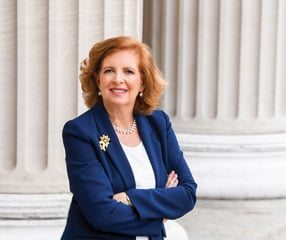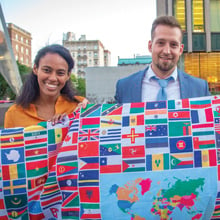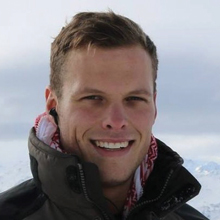2021 Leaders in Graduate Education in International Affairs
THIS GUIDE IS NO LONGER ACTIVE. For the current FP Guide, click here.
Columbia University, School of International and Public Affairs
Deep Learning, Essential Skills, Experience Keep Graduates Nimble for a Changing World

Merit E. Janow, Dean, School of International and Public Affairs, Columbia University
In a fast-moving world where violent conflicts and environmental problems quickly spill across borders, Columbia University’s School of International and Public Affairs (SIPA) prepares its students for the range of ways they could help address such challenges. While some aim to enter government or multilateral institutions, SIPA graduates also consider many other avenues, and often mix and match them.
“People are taking their policy passions into many different fields, including the private sector, the public sector, and nongovernmental organizations, as well as their own entrepreneurship,” SIPA Dean Merit E. Janow says. “This is not about your first job. It’s about giving you the building blocks and perspectives for a lifelong career.”
People are taking their policy passions into many different fields, including the private sector, the public sector, and nongovernmental organizations, as well as their own entrepreneurship. This is not about your first job. It’s about giving you the building blocks and perspectives for a lifelong career. Janow’s own life and career have crossed many frontiers. Raised abroad—in northeast Asia and elsewhere—by parents who worked in international business, Janow became a corporate lawyer. She later served as deputy assistant US trade representative for Japan and China, before joining Columbia. During her 25 years as a professor at both SIPA and Columbia Law School, Janow has continued her international work. She headed the first international antitrust advisory committee to the US Attorney General, served on the World Trade Organization’s Appellate Body, and remains an inaugural member of the international advisory council for China’s sovereign fund.
Janow’s own life and career have crossed many frontiers. Raised abroad—in northeast Asia and elsewhere—by parents who worked in international business, Janow became a corporate lawyer. She later served as deputy assistant US trade representative for Japan and China, before joining Columbia. During her 25 years as a professor at both SIPA and Columbia Law School, Janow has continued her international work. She headed the first international antitrust advisory committee to the US Attorney General, served on the World Trade Organization’s Appellate Body, and remains an inaugural member of the international advisory council for China’s sovereign fund.
To cultivate this type of intellectual flexibility in its graduates, SIPA offers a combination of deep academic learning, skills building, and applied experiences. Students can focus on a field such as energy and the environment and layer it with a geographic specialty, such as Africa. Every student is trained in statistics and economics, which have become essential background skills for an increasing number of fields.
“Many of these young professionals are going to be doing things we cannot know now or even possibly imagine,” Janow says. “It’s really important that what they’re learning is going to give them that kind of analytical depth and understanding and perspective over time, along with skills that will keep them nimble for a great, changing world.”
Experience, Expertise, and Mentorship Supercharge Faculty’s Inspiration and Guidance
 Ryan Dahm, a second-year Master of Public Administration candidate, is concentrating in international security policy and specializing in management. A former US Army infantry officer, he calls SIPA his “dream school.” He’s been inspired by the professional experience and academic expertise of professors such as Thomas Christensen, a China scholar who previously was deputy assistant secretary of state for East Asia and the Pacific, and Stephen Sestanovich, who as ambassador-at-large in the late 1990s coordinated US policy on countries of the former Soviet Union. Dahm also appreciates the mentorship of resident experts such as Peter Clement, a former top CIA official and Russia analyst in the agency’s Directorate of Intelligence.
Ryan Dahm, a second-year Master of Public Administration candidate, is concentrating in international security policy and specializing in management. A former US Army infantry officer, he calls SIPA his “dream school.” He’s been inspired by the professional experience and academic expertise of professors such as Thomas Christensen, a China scholar who previously was deputy assistant secretary of state for East Asia and the Pacific, and Stephen Sestanovich, who as ambassador-at-large in the late 1990s coordinated US policy on countries of the former Soviet Union. Dahm also appreciates the mentorship of resident experts such as Peter Clement, a former top CIA official and Russia analyst in the agency’s Directorate of Intelligence.
Columbia University, School of International and Public Affairs
https://www.sipa.columbia.edu/admissions
[email protected]
212-854-6216![]()
Contents
- 2021 Leaders in Graduate Education in International Affairs
- Tufts University, The Fletcher School
- Northwestern University
- Nova Southeastern University, Master’s Program in National Security Affairs and International Relations
- Johns Hopkins University School of Advanced International Studies
- Columbia University, School of International and Public Affairs
- George Mason University, Schar School of Policy and Government
- University of Kent, Brussels School of International Studies
- Arizona State University, Thunderbird School of Global Management